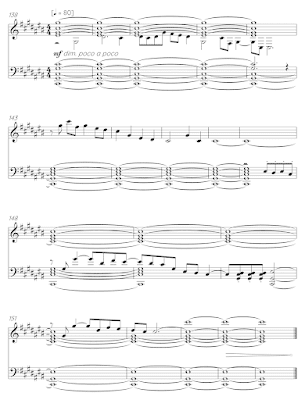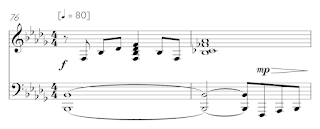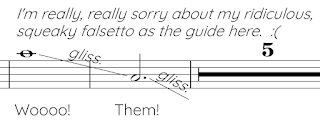While I think "Faraway Island" will go down as this project's biggest technical hurdle for various reasons, the honour of being the biggest emotional hurdle goes to the other extended piece: a suite combining elements of "March for the Age", the "Escapes" and "After the Party", closing the album, which I have decided to title simply "Escapade". (I can already imagine feeling the need to reassure the other musicians that this is not a Janet Jackson cover.) Given the emotionally charged nature of this track, as well as it being the most drastic musical re-working by far, I have decided to prepare the score in advance alongside working on the other stuff, so that when we "officially" get to this one I can concentrate solely on lyrics.
All three of its component parts are, in isolation, among the musically darkest material in the set. Moreover, as things stand the long C-sharp major chord (with instrumental noodling on top) that ends "My Last Escape", and consequently both Escapade and Escapade 2, feels to me like a tacked-on happy ending, even though I'm also convinced it is the right ending for the album. Therefore, the task at hand is to contextualize this ending by fusing three songs of despair into one song of hope.
 |
| This is where it's going. |
The piece basically falls into 4 main sections:
- "March for the Age" - bars 1-27
- "My Next Escape" - bars 28-75
- "After the Party" - bars 76-102
- "My Last Escape" - bars 103-155
I've included the original titles in this breakdown solely for reference. What strikes me immediately here is that the "Escapes" ultimately provide basically two-thirds of the music! Well, I did say I was going to work in "salvageable elements" of the other two songs, after all.
The "March for the Age" section consists largely of the strings/flute "B" section of the original. This is not so much a new idea as a return to form: in the sketch this is ultimately based on, this served as intro and verses, paired with what would become the "Escapes" chorus. As a transition to the "My Next Escape" section we have the only contribution from the harmonically static "A" sections of the march. I felt this to be necessary because it does have a melodic connection to that ending.
 |
| It's been Yamaha-strings. It's been Jupiter-theremin. This time it's going to be clean electric guitar, an octave lower of course. |
I decided to make it more interesting by adding a bass guitar countermelody based on the longer variant of the "Escapes" post-chorus.
The "My Next Escape" section is largely unaltered from the original, up to and including the guitar solo verse. It's worth mentioning that in the second verse of the Escapade 2 version, I remember absent-mindedly pushing the button to record some harmony vocals despite not having a plan, and surprising myself by improvising a really inspired part! I like the result so much that I've transcribed it for the new version, even with no lyrics as yet.
I didn't want to overexpose the "Escapes" chorus before the piece is coming in to land. Therefore, rather than leading into the second chorus, the guitar solo instead leads directly into the "After the Party" section. This is not a full statement of what is, after all, my least favourite song on either Escapade. Instead it's basically just enough of a nod to "After the Party" to open up new possibilities for the next and final section of the piece. I have of course completely re-written the piano part to (hopefully) not be such a flagrant "The Great Gig in the Sky" wannabe this time!
 |
| It's a harmonic what-if scenario inspired by "The Great Gig in the Sky". That does not mean it should actually sound like that Pink Floyd classic! |
Only then do we get a second "Escapes" chorus. But it's not quite the same! The detail of one chord being changed in this restatement, doesn't seem so random in this version: the altered chord happens to be a tritone away from the key chord, so the interpolation of "After the Party" material contextualizes it. This is followed not by just a cursory nod to "March for the Age", but instead a whole "verse" using a written solo adapted from the original pre-divergence sketch. That sketch is probably from February 2006, by the way, making it the oldest material on the whole album.
And then, at last, we have the final chorus (only the 3rd statement, compared to effectively 4 in previous versions) and the blissful C-sharp major finish.
To me, this feels like a new composition that happens to consist entirely of old material. I already cannot imagine a more fitting conclusion to Chronicles of a Dead End.


